Air Cooled Chillers
Air-cooled chillers present an innovative approach to cooling solutions, offering flexibility and efficiency across various applications. What makes them a preferred choice in numerous settings? Discover their advantages!
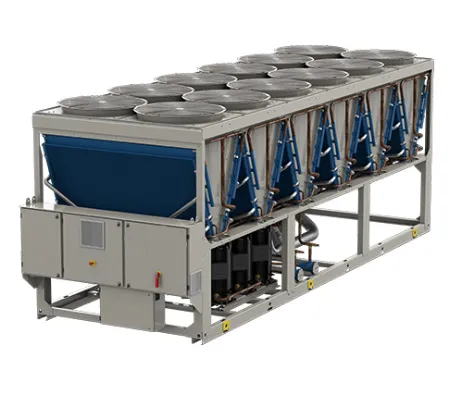
Introducing Air-Cooled Chillers: A Smart Cooling Solution
Air-cooled chillers represent a modern method for effective cooling technology. By utilizing ambient air for heat exchange, these systems provide reliable performance while reducing water usage. Ideal for diverse environments, air-cooled chillers help maintain optimal conditions while supporting sustainability efforts. Explore how these chillers can enhance your cooling strategy with their adaptability and advanced features.
What Makes Air-Cooled Chillers Stand Out?
Air-cooled chillers distinguish themselves from traditional systems by relying on air for cooling, eliminating the need for water sources. This innovative design results in lower installation and operating costs, making them an economical choice for various applications. Their robust performance and minimal maintenance requirements ensure reliability in demanding environments, positioning air-cooled chillers as a leading option for modern cooling needs.
The Way Air-Cooled Chillers Work
Air-cooled chillers operate on the refrigeration cycle, involving four essential processes: evaporation, compression, condensation, and expansion. The process begins with refrigerant absorbing heat from the environment as it evaporates in the evaporator. The refrigerant gas is then compressed, increasing its temperature and pressure. It flows into the condenser, where ambient air cools it, allowing it to condense back into a liquid. Finally, the refrigerant passes through an expansion valve, lowering its pressure and temperature before returning to the evaporator. This continuous cycle enables efficient cooling for various applications.
Key Benefits of Why to Choose Air-Cooled Chillers
These chillers offer numerous advantages that make them an excellent choice for cooling solutions. Key benefits include:
- Significant savings through efficient operation
- Suitable for various facility sizes and environments
- Simple setup without complex water needs
- Fewer components for lower maintenance and greater reliability
- Uses refrigerants with lower global warming potential
- Fits easily into tight spaces, maximizing facility area
- Tailored solutions for specific cooling requirements
Exploring the Varieties of Air-Cooled Chillers
Air-cooled chillers are available in various designs to meet specific cooling needs. Two common types are scroll chillers and screw chillers, each with distinct advantages.
Air Cooled scroll Chiller
Scroll chillers use spiral-shaped components to compress refrigerant, offering a compact and efficient cooling solution. Known for reliability and quiet operation, they are ideal for smaller to medium-sized applications, such as office buildings and healthcare facilities. With fewer moving parts, scroll chillers require less maintenance and provide consistent performance in a smaller footprint.
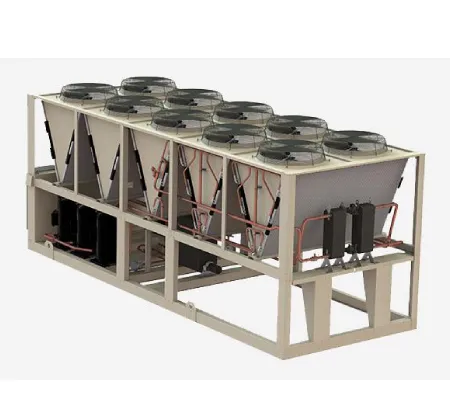
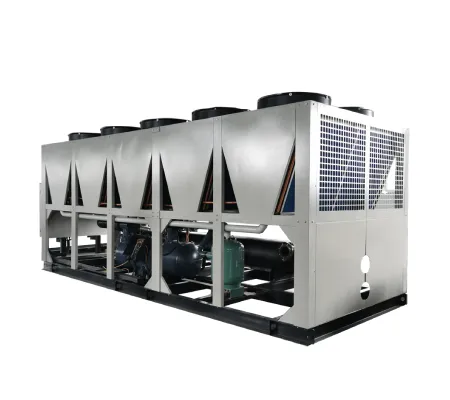
Air Cooled Screw Chiller
Screw chillers employ a helical screw mechanism for refrigerant compression, making them suitable for larger cooling applications. They excel in industrial settings, such as manufacturing plants and data centers, handling significant heat loads with high efficiency. Their advanced control systems enable precise temperature management, ensuring robust performance for facilities with substantial cooling demands.
Ideal Facilities for Air-Cooled Solutions
Air-cooled vapor compression chillers excel in specific facilities where cooling efficiency and reliability are paramount. Here are detailed insights into the core facilities that benefit most from these systems:

Hospitals and Healthcare Facilities
Hospitals require precise climate control to ensure patient comfort and protect sensitive medical equipment. Air-cooled chillers are vital in areas such as operating rooms, recovery rooms, and patient wards, where maintaining consistent temperatures is essential for optimal care. These chillers can efficiently manage varying loads while using environmentally friendly refrigerants, ensuring compliance with health regulations.

Commercial Office Buildings
Air-cooled chillers are an excellent fit for multi-story office buildings, where maintaining a comfortable working environment is essential for productivity. These chillers provide efficient cooling to large open spaces, conference rooms, and individual offices, adapting to the diverse needs of various occupants while being easy to install and maintain.
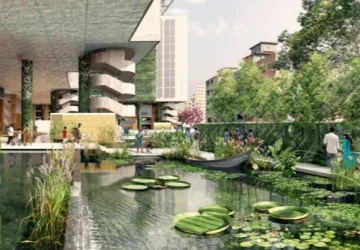
Educational Institutions
Schools, universities, and research facilities require effective cooling solutions to create conducive learning environments. Air-cooled chillers efficiently manage temperatures in classrooms, laboratories, and recreational areas, allowing institutions to focus on education without worrying about climate control.
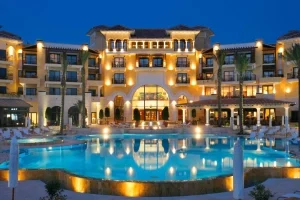
Hospitality Venues
Hotels and resorts need reliable cooling systems to enhance guest experiences. Air-cooled chillers can efficiently cool guest rooms, lobbies, dining areas, and conference rooms. Their compact design allows for flexible installation, making them suitable for various property layouts and sizes.
Navigating Challenges: Effective Solutions for Air-Cooled Chillers
While air-cooled chillers offer significant advantages, certain challenges may arise. Below are common issues along with effective solutions:
Outdoor Noise Levels
Air-cooled chillers can produce noise that disturbs nearby areas. To minimize this, it’s helpful to choose models with noise-reduction features and place them away from people. Using sound barriers or landscaping can also reduce noise impact, making the environment more comfortable.
Temperature Fluctuations
Inconsistent temperatures can affect cooling efficiency. Installing advanced control systems with real-time monitoring ensures precise temperature control. These systems adjust the cooling output based on outdoor conditions, helping maintain stable temperatures and improving comfort.
Dust and Debris Accumulation
Dust and debris can reduce the efficiency of air-cooled chillers. Regular cleaning of coils and filters is key to preventing this. Setting up a routine maintenance plan keeps the unit working efficiently and extends its life, avoiding expensive repairs.
Energy Consumption
Air-cooled chillers can use more energy in hot climates. Energy-efficient models with variable speed drives optimize power usage. Pairing these systems with advanced controls improves energy management, reducing costs and environmental impact.
Custom Solutions: Partner with Experts in Air-Cooled Chillers
Tailoring air-cooled chiller solutions involves assessing specific cooling needs, including facility size, load requirements, and environmental considerations. Collaborating with experienced professionals ensures a customized approach that optimizes performance and efficiency.
Tritech stands out in providing tailored air-cooled chiller solutions, backed by extensive expertise and a commitment to client satisfaction. By focusing on energy efficiency and operational reliability, Tritech partners with clients to create systems that meet both current demands and future growth.
Looking for an efficient air-cooled chiller? Tritech can help. Contact us now!
Related Brands





FAQs
An air-cooled chiller is a cooling system that efficiently removes heat using ambient air as a heat exchange medium. It is commonly used in industrial and commercial applications for its effective cooling capabilities.
Air-cooled chillers operate by compressing refrigerant gas, which absorbs heat from the environment. The heated refrigerant is then cooled by ambient air in the condenser, turning back into a liquid and repeating the cooling cycle efficiently.
Benefits include lower energy costs, ease of installation, reduced maintenance, versatility for different applications, and environmentally friendly operation with sustainable refrigerants.
These chillers are often installed in commercial buildings, industrial facilities, hotels, data centers, and other environments where effective cooling is essential.
Common types include scroll chillers, known for their quiet operation, and screw chillers, suitable for larger loads and ideal for managing substantial cooling capacities.
Selecting the right chiller involves evaluating your cooling requirements, facility size, and infrastructure. Consulting with experts can help you find a tailored solution that ensures optimal performance and efficiency.
Contact Our HVAC-R Experts
With experts and sales engineers throughout the country, we're ready to talk, anytime. · How can we help you today?
